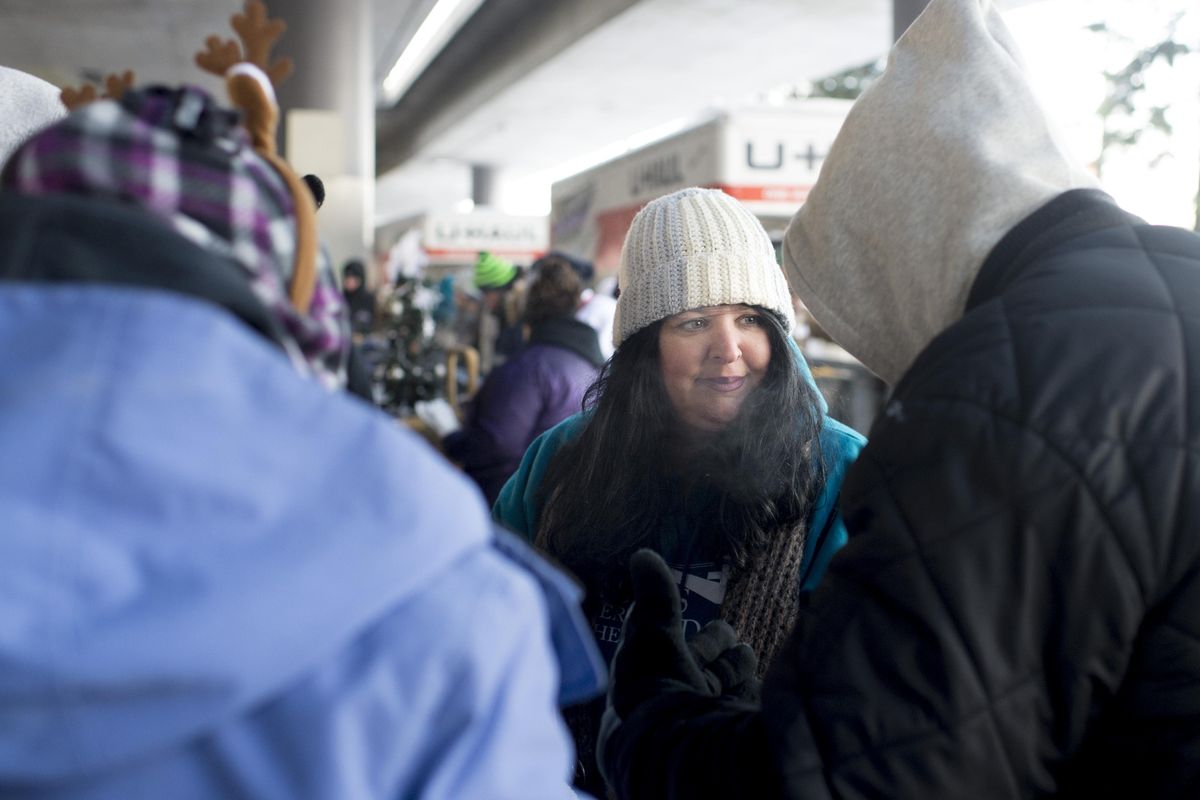Jessica Kovac changes lives through the gift of a meal

It may have been cold last Saturday, but that didn’t matter to 500 people who formed a line curling beneath the Interstate 90 bridge waiting for a prime rib dinner with all the trimmings.
Linen covered tables and snowflake centerpieces helped Jessica Kovac welcome the city’s hungry and homeless.
During the past 10 years, she has fed and clothed thousands of Spokane’s poor – women, children and men afflicted by poverty and personal struggle.
She does not judge. She does not scold. She only tries to make their lives a little easier through her Blessings Under the Bridge program.
“The thing about Jessica is she treats everyone the same way. She is always upbeat,” said Robert Martin, community outreach manager for United Healthcare, a sponsor of the program. “I know she’s tired when she’s done. I know she’s beat. But she puts on that smile.”
Her program is so popular that there’s a waiting list to volunteer at the weekly meals handed out under the bridge where a concrete park used to summon skateboarders. Saturday’s special prime rib dinner was donated by the Kalispel Tribe.
Kovac has been on the “Rachel Ray Show” and in People Magazine. She’s done a TEDx talk. She’s gained support from Microsoft executives and Spokane small business owners. She’s won grants and signed big sponsors. And she prays to God for support.
“I just tell my story,” Kovac said. “I never feel like I really make a pitch, but then someone writes a check.”
Blessings has served 100,000 meals to homeless and low-income people in Spokane over the past 10 years. Kovac doesn’t ask for ID or proof of address. She doesn’t try to transition homeless people into permanent housing. Blessings doesn’t do anything other than feed people.
“I can’t see anything wrong with that,” Martin said. “A homeless person can come there and be there for three hours and just be, and that’s a beautiful thing.”
In May, Blessings received a $12,000 grant from the Inland Northwest Community Foundation.
While Kovac is proud of what she started, she sometimes longs for simpler times.
“There are days where I wish I was back at just packing 50 lunches and taking them down here on my own,” she said. “I don’t want to be an organization. Or a program. This is my heart.”
It all began 10 years ago when her husband injured his back, their marriage was on the rocks and she needed a shakeup. The sum of her problems became a compulsion to first help others.
After 25 years in the restaurant business, Kovac, on a whim, purchased sandwich makings at Albertsons, packed sandwiches in brown bags, and stuck a case of water in the back of her car.
Then she headed downtown to look for the hungry.
Her husband tried to stop her.
Her friends from church told her to bring pepper spray and warned her that street dwellers would just take advantage and hustle her for money.
“I still went. In my high heels and everything,” Kovac said. “I was so clueless. But I had no fear.”
She pulled up next to a guy and handed the first sack lunch out of her car window.
With a sinking heart, Kovac watched him walk toward a big garbage dumpster thinking that he’d dump the lunch, just like everyone had told her.
“But he leaned against the dumpster and slid down and sat there, and then he just devoured the food,” Kovac said. “And guess what? To this day, no one has ever asked me for money.”
It was under the bridge in 2010 that her husband, Mike, made friends with Homer Hill, a homeless man the Kovacs were able to reunite with his family in Florida.
“The family thought he’d been dead for 17 years,” Kovac said. “He really became like a dad for Mike.”
Hill got to spend some quality years reunited with his daughter before she died. A couple of years after that, Hill returned to the streets. He became ill. A hospital found Mike Kovac’s contact information in Hill’s wallet, and he was able to travel to Florida and be there with him before Hill died.
“That’s when you really feel it. That’s a truly selfless act. I love what she does,” Martin said.
Through their work with Blessings, the Kovacs’ marriage began to heal.
Yet her own perceived shortcomings sometimes shine through.
Kovac said she grew up feeling shunned and misunderstood. She always felt different, like an outsider. And she has no education.
“I think it’s so easy for me to relate to the homeless, because I can identify with them,” Kovac said. “I felt the same way. Unwanted. An outsider.”
After Saturday’s stint in the biting cold, it took hours before Kovac warmed back up.
Saturday’s pack-up crew took all the tables and supplies to Blessing’s office and on Monday Kovac had to go back and pack things away – and get ready for Wednesday’s feed.
“There are some days where I wish it would stop, but it doesn’t,” Kovac said, laughing. “This is a calling. I look at myself as someone who’s been found.”